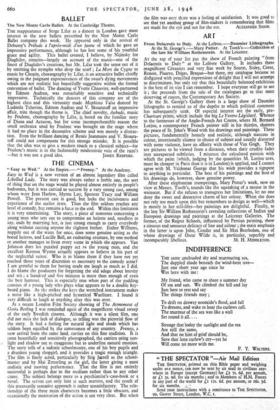THE CINEMA
" Easy to Wed." At the Empire.—" Frenzy." At the Academy. Easy to Wed is a new version of an almost legendary film called Libelled Lady. The story was always rather a feeble one, the sort of thing that on the stage would be played almost entirely in people's bedrooms, but it was carried to success by a very strong cast, among whom were Jean Harlow, Myrna Loy, Spencer Tracy and William Powell. The present cast is good, but lacks the incisiveness and experience of the earlier itars. Thus the film seldom reaches any level of comedy, but remains a farce to the end. Within this limitation it is very entertaining. The story, a piece of nonsense concerning a young' man who sets out to compromise an heiress and, needless to say, ends by marrying her, is just strong enough to carry everybody along without causing anyone the slightest bother. Esther Williams, happily out of the water for once, does some genuine acting as the bored heiress, and Lucille Ball, an endearing creature, by one method or another manages to liven every scene in which she appears. Van Johnson does his puzzled puppy act as the young man, and the excellent Keenan Wynne actually appears to believe in his part of the neglectful suitor. Who is to blame them if they have not yet reached those years of discretion so necessary to the comedy actor? I am grateful to them for having made me laugh as much as I did. 1 do blame the producers for forgetting the old adage about brevity and wit ; a hundred and five minutes is more than enough of even :he best humour. This is especially true when part of the padding consists of a young lady who plays what appears to be a double key- board piano. As she strikes the keys the wretched instrument makes a noise like a high-pitched and hysterical Wurlitzer. I found it very difficult to laugh at anything after this was over.
At a recent London Film Society showing of The Atonement of Gosra Berling I was reminded again of the magnificent visual sweep of the early Swedish cinema. Althotigh it was a silent film, one did not miss the lack of dialogue, so telling was the pictorial flow of the story. It had a feeling for natural light and shade which has seldom been equalled by the cameramen of any country. Frenzy, a new arrival from the same land, carries on this fine tradition. It is most beautifully and sensitively photographed, the camera using sun- light and shadow not to exaggerate but to underline natural emotion. The story tells of a -sadistic schoolmaster, one of his boy pupils and a drunken young shopgirl, and it provides a tragic enough triangle. The film is finely axed, particularly by Stig Jarrell as the school- master and by Mai Zetterling as the girl, the latter giving a most realistic and moving performince. That the film is not entirely successful is perhaps due to the medium rather than to any other cause. The subject belongs more to a psychiatrist's -case-book or a novel. The screen can only hint at such matters, and the result of this necessarily tentative approach is rather unsatisfactory. The rela- tionship of the three main characters becomes a little obscure, and occasionally the motivation of the action is not very clear. But when the film was- over there was a feeling of satisfaction. It was good to see that yet another group of film-makers is remembering that films are made for the eye and not for--the ear. ALEXANDER SHAW.






























 Previous page
Previous page